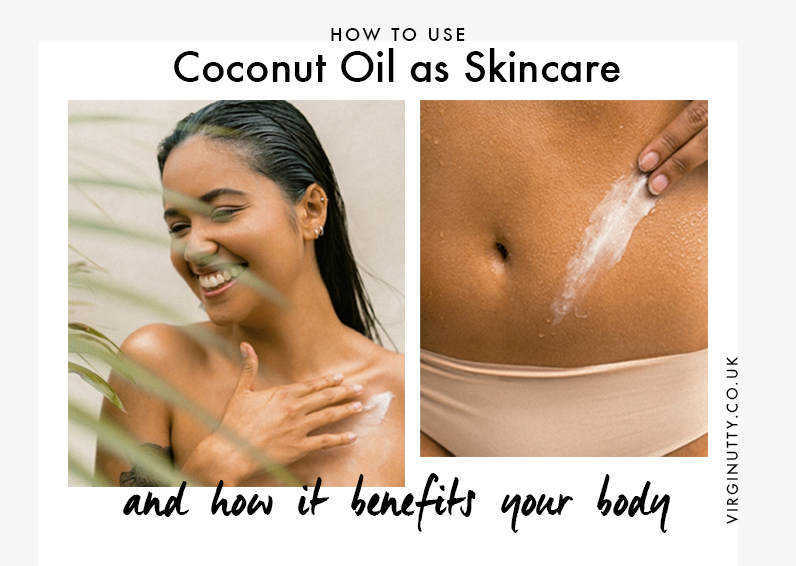How to Use Coconut Oil for Skin Care
For thousands of years, coconut oil has been used by tropical communities all over the world.
Not just in their diets, but also, in their daily grooming ritual. One traditional use for coconut oil - especially in the Philippines, where our coconuts originate - is as a skin moisturiser.
The powerful moisturising and healing properties of coconut oil mean that is widely used and recommended as a natural alternative not just for moisturiser, but also for topical skin conditions such as eczema.
What are the benefits of using coconut oil on the skin?
Coconut oil is bursting with medium-chain fatty acids (MCFAs) that deliver a dazzling amount of benefits when applied to skin. This chemical structure means that our skin absorbs coconut oil very easily.
Coconut oil also contains anti-bacterial, anti-fungal and anti-oxidative properties that can help speed up healing of surface wounds, scars, and burns, as well as infections such as warts or thrush.
Applied to the skin, coconut oil can also:
Moisturise dry or flaky skin
Actively prevent wrinkles
Heal wounds, cuts, and burns
Reduce the appearance of scars and stretch marks
Soothe eczema and psoriasis
Protect skin from chlorine whilst swimming
Soothe sunburn and speed up healing
Can I use coconut oil as a moisturiser?
Yes, coconut oil is packed with proteins, vitamin E molecules, and fatty acids (namely, lauric, capric and caprylic acid) which work wonders on skin when applied as a daily moisturiser.
Coconut oil helps combat the harmful effects of pollution and chemicals on skin by sealing in skin moisture, and helps prevent premature ageing and wrinkling by stimulating collagen production.
Our skin produces and is lubricated by sebum, which forms a natural defensive barrier against germs. However, sebum levels on our bodies can be ruined simply by daily washing habits or even a poor diet. Moisturising with coconut oil can help restore our natural sebum balance, sealing in moisture and improving skin elasticity all over.
Make sure that your coconut oil is the highest possible quality - organic, cold-pressed, raw, and virgin - otherwise you will not receive the full benefits that it can offer to your body.
What skin problems can coconut oil treat?
Coconut oil contains powerful moisturising and healing properties that are so effective that coconut oil is widely used and recommended as a natural alternative not just for moisturiser, but even for topical skin conditions such as eczema and psoriasis.
Coconut oil has been known to treat, or even prevent, a number of skin problems and fungal infections including:
Eczema
Psoriasis
Dandruff
Insect bites and stings
Athlete’s foot
Thrush
Warts
Premature ageing
Nappy rash
Dermatitis
Dry and flaky skin
Test coconut oil on a specific area for a week to see if there are any notable improvements in your skin condition.
Can I use coconut oil as a shaving cream?
Yes - coconut oil is a highly moisturising natural alternative to drugstore shaving foams. Simply rub a thin layer of coconut oil onto your body and shave as normal.
Note: if you shave using coconut oil, wipe the hairs away with a tissue and throw it in the bin so that nothing blocks your drain.
Can I use coconut oil as a sexual lubricant?
Yes, you can use coconut oil as lube! Coconut oil provides an incredibly safe and natural, environmentally-friendly, toxin-free way to feel good during sex and lubricate your private parts.
The 'pleasure industry' is not subject to the same safety and manufacturing regulations as food and cosmetics industries are. Make sure you're getting hot under the collar in a way that treats your body - and your beautiful bits - well.
Getting intimate is the most natural thing in the world, so why in the world would you put something unnatural on your intimates?
Note: Coconut oil is not compatible with latex, so make sure you use it solo or with a trusted sexual partner.
Only use cold-pressed, extra virgin, organic and raw
If you are going to be using coconut oil on your body, especially in intimate areas, you must ensure that your coconut oil is cold-pressed, raw, virgin, and organic.
You don’t want to be applying products that contain toxins and parabens to your most sensitive parts, or to mucous membranes that will instantly absorb everything!
The purity of the coconut oil you use affects the efficacy of fatty acids and vitamins on your skin. You will not receive the full benefits of the coconut oil if it has been heat-treated, pasteurised, or mixed with non-natural chemicals.
If you wouldn’t eat something, why would you put it on your skin?
We hope this has been helpful. Remember to use the highest possible organic virgin coconut oil you can find. The body is a temple!




